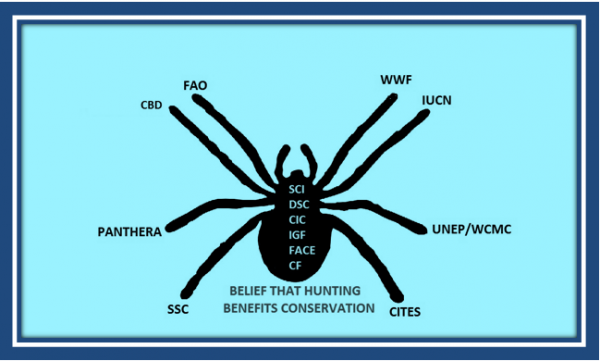News
Latest Lion Aid News
The long reach of the hunters
Monday 7th April 2014
|
Some of those convinced
We should be under no delusion that hunters and trophy hunters haven’t deeply penetrated and influenced a number of NGOs and International Agencies. This is largely because such agencies support “sustainable utilization”, a very vague term. In terms of trophy hunting, such organizations consider the activity part of sustainable use with the usual caveats:
In reality none of these caveats, while explicitly stated, are actually monitored. This would seem especially crucial for trophy hunting of endangered species and/or those with complex social structures like lions. Some of the hunting lobbying groups are going out of their way to increase their reach. For example, in 2004 the Federation of Associations for Hunting and Conservation of the EU (FACE) signed an agreement with Birdlife International (who describe themselves as “widely recognised as the world leader in bird conservation”) to allow hunting even within the Natura 2000 areas – a network of European nature protection areas. Also, the IUCN published in 2013, under their logo, a report entitled “Hunting: Conserving wildlife, key to global cultural heritage” . This was a direct transcript of the report of the Jubilee 60th General Assembly of the International Council for Game and Wildlife Conservation (CIC), a pro-hunting organization. In that report, Jon Hutton, Executive Director of UNEP-WCMC, was quoted as saying "Hunting is not part of conservation; it is conservation”. Not to be outdone, Dr Braulio Ferreira de Souza Dias, Executive Secretary of the Convention on Biological Diversity (CBD) gave a message of support as well that “served to further highlight the importance of the sustainable use of wildlife in the conservation biological diversity and preservation of rural livelihoods". At the same time [the message] acknowledged the leading role which the CIC is playing in actively achieving this objective, in close collaboration with the CBD. The Jubilee meeting also resulted in the agreement to jointly map possible areas of collaboration between the CIC and Interpol in order to work towards a Memorandum of Understanding between the two organizations. A further meeting with representatives of the Food and Agriculture Organisation of the United Nations (FAO) ”confirmed the intent of both CIC and FAO to collaborate further, beyond the joint work which has already been done.” The IUCN even has a Use and Livelihoods Specialist Group chaired by Rosie Cooney, formerly of WWF International. This specialist group is openly pro-trophy hunting. In addition the Species Survival Commission has published a special document on Trophy Hunting as a Tool for Creating Conservation Incentives in 2012 .
This is the reach of the trophy hunting organizations, and there are very many more examples. The problem, of course, is that while all these NGOs and Agencies state that they support trophy hunting with all the caveats listed above, there seems little drive to actually engage in the monitoring role they deem so important. Such monitoring of whether trophy hunting is sustainable, well-managed, beneficial to the conservation of the species, etc – remains left to others. And who those others are remains a mystery, as there are no scientific studies that have actually proven conservation benefits to African lion trophy hunting, apart from those that mention economic benefits. Indeed, scientific studies undertaken in Zambia, Zimbabwe, Cameroon, Benin and Tanzania actually show the opposite. These are largely ignored. As long as major international conservation NGOs and Agencies maintain their uncritical and supportive stances on trophy hunting, without conducting their own independent determinations, it will require considerable additional effort to convince them that buying into propaganda is not in their best interests. If you have not already signed up to our mailing list, you can add your name here and keep up to date with our ongoing work and, most importantly, DONATE to support our work to conserve the remaining fragile lion populations. Thank you. |
Posted by Chris Macsween at 17:42
No comments have been posted yet.
Add a new comment
Existing user
New user sign up




